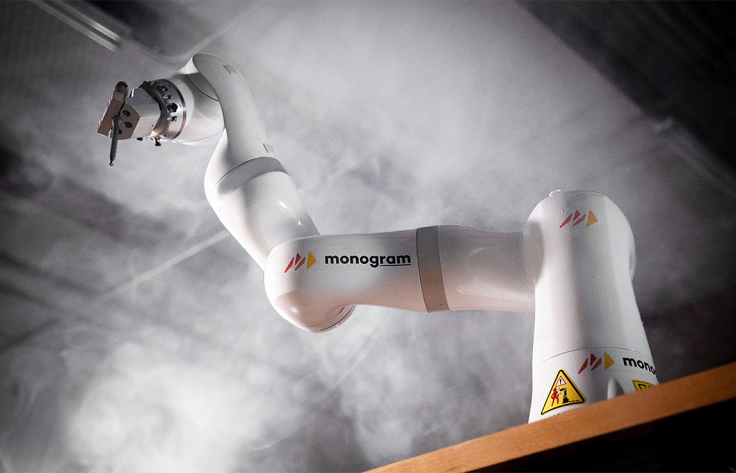This 3-D Printing Surgical Robot Is Ready To Revolutionize The Joint Replacement Industry

Monogram Orthopedics takes a personalized approach to joint replacement. The company's robotic arm prepares the bone for specially designed 3D-printed joint implants that fit each patient with high precision. The system could enable surgeons to replace joints with fitted implants and less-invasive procedures, potentially reducing infection rates, the incidence of dislocation and implant failure, and ultimately, the team hopes, patient outcomes (the products are not yet FDA approved).
With $16.7 million in capital and its growing list of preorders, Monogram Orthopedics expects to turn a profit by the end of 2021. Monogram's technology is indeed poised to transform the world's joint replacement market, and here's why...
Generic Implants Come at a High Cost for Patients
Traditional hip and knee replacements can be inefficient, subject to error, and prone to failure. Even today's most cutting-edge implants are mass-produced. They are placed manually by surgeons that measure a joint's proportions, then cut away at the afflicted bone with saws and jigs. Once they've made room for the implant, surgeons often secure them in place with bone cement, which has the potential to crack over time after surgery. Implants are prone to failure, with many thousands of patients returning to hospitals for further operations every year.
These problems are well-known to the medical community. Leading causes of failure include instability, poor positioning, and cement breakage.
Monogram believes they can mitigate all these issues with technologies like 3D mapping and printing, which have helped solve similar problems in other medical fields. Today, doctors and patients are seeking more personalized, precise, and reliable implant solutions. That's where Monogram comes in.
Personalized Implants Deliver Better Patient Outcomes
In contrast to its competitors' generic products, Monogram's custom-printed implants use each patient's unique bone structure as a blueprint. The manufacturing process starts with a CT scan of the joint to be reconstructed. Data from this scan powers an AI-driven preoperative interface, which uses predictive algorithms to help the surgeon plan the procedure from every angle. An automated fabrication system then 3D-prints the implant, shaping it to fit seamlessly into the patient's joint.
The second component of Monogram's system is a surgical robotic arm. Guided with the help of real-time virtual navigation, the robot follows the preoperative plan with minimal need for manual guidance—effectively eliminating human error from the surgery itself. The arm begins by making a small incision, and then it clears out a precisely sculpted cavity in the bone using a milling drill. The implant is fitted snugly into the cavity with no cement, which Monogram boasts is up to 270% more stable than its generic counterparts.
Together, Monogram's hardware and software represent long-awaited innovations for the orthopedic sector. The adoption of Monogram's technology could significantly reduce instances of loosening and dislocation, resulting in far fewer repeat surgeries and hopefully more satisfied patients.

Robots and 3D Printing Are Both on Track for Rapid Expansion
As low-wear plastics make knee implants more practical for people under 65, young and active patients could account for more than half of all knee replacement procedures by 2030—creating a total market of at least $12.5 billion.
Companies who make it to market first in this sector could realize a sizable advantage over their competition. For example, today's leading orthopedic robot outsells its second-place rival 12 to one, with an 87 percent market share. Monogram's team has a lot of insights on the limitations of that robot—and right now, Monogram is the only company developing an active-milling robot arm to install custom 3D-printed implants.
In short, Monogram has a first-to-market advantage in a sector that's rapidly growing. It is entering the market using a multipronged approach designed to mitigate risk while leveraging the tremendous marketing power of crowdfunding.
Monogram is aggressively generating a next-generation implant that will be married to its surgical robot, completing the rollout of its entire integrated solution to joint replacement.
Monogram has already raised $16.7 million from more than 6,700 investors over three successful financing rounds. With its current live round, Monogram offers individual investors the chance to purchase shares typically restricted to venture-capital firms and banking institutions. It has already sold $7.3 million of those shares, exceeding yet another funding target.
The future of medicine is personalized. Individually tailored implants and robotic surgeries will be the norm by the end of this decade. By then, Monogram may well be the leader in this rapidly changing space—enabling surgeons to deliver a new standard of care to their patients.




















